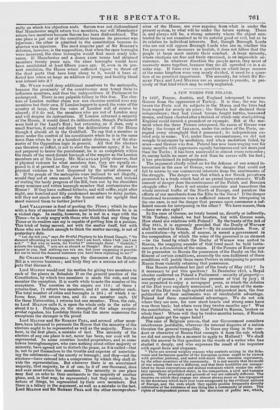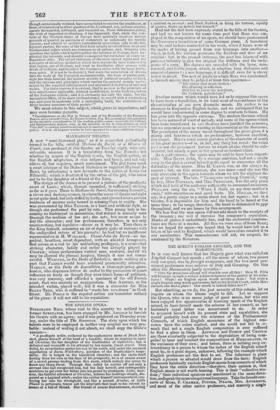A FEW WORDS FOR POLAND.
IN 1827, France, Austria, and England interposed to rescue Greece from the oppression of Turkey. It is true, the war be- tween the Porte and its subjects in the Morea and the Isles had been waged for nearly six years ; the Greeks had declared their independence ; they had raised troops, fought battles, borrowed money, and been cheated after a fashion of which only stockjobbing England could furnish a precedent or example. But at the mo- ment when the three Powers interposed, the cause of Greece was fallen ; the troops of IBRAHIM, under the orders of the Porte, oc- cupied every stronghold that it possessed ; its independence ex- isted only in name. Yet, under these circumstances, we did not scruple to interpose by mediation, and when mediation failed, by arms—and Greece was free. Poland has now been waging war for many months with oppressors equally barbarous and not more just than the Turks ; it has been successful in almost every rencontre ; its enemy holds no more of its soil than he covers with his foot ; it has proclaimed its independence. The argument chiefly relied on for the defence of our armed in- tervention in the case of Greece, was the danger that could not fail to accrue to our commercial interests from the continuance of the struggle. The danger was that which a few Greek privateers presented to a trade which had at no period been extensive. What amount of danger does the continuance of the Polish and Russian struggle offer ? Does it not render uncertain and hazardous the whole internal traffic of the North of Europe, and paralyze the efforts of our merchants from the Elbe to the Neva? If the danger threatened to commerce was a sufficient reason for interposing in the one case, is not the danger that presses upon commerce a suf- ficient reason for interposing in the other ? We have reason, then —have we also right ? In the case of Greece, no treaty bound us, directly or indirectly. With Turkey, indeed, we had treaties, but with Greece none. How stand our relations with Poland? By the treaty of the 3rdof May 1815, it is expressly provided that the Duchy of Warsaw shall be united to Russia. How ?—By its constitution. Now, if a constitution—by which, of course, is meant a government in the composition of which the voice of the governed is an element —be the bond by which the Duchy of Warsaw was united to Russia, the snapping asunder of that bond must be held tanta- mount to a dissolution of the union. If the Powers of Europe saw fit to guarantee to Russia the possession of the Duchy on the ful- filment of certain conditions, assuredly the non-fulfilment of these conditions will justify those same Powers in interposing to prevent Russia from violently retaining that possession. Has Russia performed her part of the treaty of May 1815 ? Is it necessary to put this question? In December 1815, a Royal charter conferred on Poland a Parliament—security of property— security of person ; it received the promise of trial by jury ; it was permitted to enjoy a newspaper press, in which the debates of the Diet were regularly announced ; and, as many of the mem- bers of the Diet were high-spirited and independent men, the free publication of their sentiments was of incalculable advantage. Poland had these constitutional advantages. We do not ask where they are now, for now stout hearts and strong arms have won them hack; but where were they twelve months ago ? Was the constitution, which was to bind Poland to Russia, broken or whole then? Where will they be twelve months hence, if Russia should again get the upper hand? The case of Belgium proves, that our Government considers interference justifiable, wherever the internal disputes of a nation threaten the general tranquillity. Is there any thing in the con- duct or character of Russia that exempts it from the rule which we did not scruple for a moment to apply to Holland? We shall state the answer to this question in the words of a writer who has studied it deeply, and who expresses the result of his inquiries with equal force and elegance.
" There are several weighty reasons why contests arising in the Scla- vonic and barbarous quarter of the European system ought to be viewed with peculiar jealousy, and noted with more than common cognizance, by the other members of the community. It is not merely that themode of war among that race is differerkt, and that their hostilities are unregu- lated by those conventions and mutual restraints which render the mili- tary operations of polished states, in the comparison, a civil and humane process. Their principles and grounds of war are radically different. The maxims on which they engage are almost always more or less repugnant to the doctrines which have ever been recognized by the civilized nations of Europe, and the ends which they openly profess frequently directly subversive of the existence of any thing like a community of states. The rights of independent powers and the doctrines of public law, which, though occasionally violated, have never failed to receive the semblance, at least, of veneration in other quarters of the Continent, are, in these regions, openly disregarded, infringed, and trampled on. From this lawless policy, the fruit of imperfect civilization, it has happened, that, while the con- tests of the Western states of Europe have generally stood on narrow grounds of quarrel, as questions of commerce or indemnity for specific injuries, and related to matters immediately interesting only to the bel- ligerent parties, the wars of the East have usually involved those large and fundamental rights which are common to all nations, and, bringing into question the bonds which hold together the fecleracy of Europe, have im- plicated the interests, and directly endangered the existence of every in- dependent state. The actual violations of the most sacred rights and the examples of atrocious spoliation which have repeatedly been witnessed in that region, are of ill omen, and tend to familiarize other powers with deeds of violence, and to infect the European states with the same barha- ious spirit. It is not to he disputed, that since the association of Russia into the body of the European commonwealth, the tone of public prin- ciple has been lowered, the ancient severity of political morality relaxed, and the maxims and principles which sustain the general system under- mined by the repeated infringement and unpunished violation of national rights. For these reasons it is evident, that in no case is the principle of non-interference applicable, without modification, to the Eastern portion of the European system ; and it is obviously not only the right, but the incumbent office, of its more civilized states, to regard with a controlling eye, and even to moderate with a restraining hand, the contentions of these lawless members of their society."'
We must return to this subject, which grows in importance, and may soon become gigantic.
• Considerations on the War in Poland, and of the Neutrality of the European Powers at the present Crisis. By Hunter Gordon, Esq. Werecominend this pamphlet to the attentive consideration of the reading public.—more especially the Cabinet, and Parliamentary orators, who, in the intervals of the Reform debates, or after "the Bill" is carried, intend to distinguish themselves in the discussion of our foreign policy. It is in all respects worthy to have appeared in a more ambitious shape.



























 Previous page
Previous page